When 16-year-old Carlos Hernandez Vasquez fell ill in a holding facility at the U.S.-Mexico border, he was diagnosed with the flu and given medication, then sent back to a cell to recuperate on a concrete bench.
But Carlos didn't get better. The Guatemalan migrant died May 20 from flu complications — a glaring sign that Border Patrol stations aren't set up to manage thousands of children.
If they must, they need better medical care and a place for sick kids to convalesce, Acting Customs and Border Protection Commissioner John Sanders told The Associated Press. That's why Congress must pass the $4.6 billion in emergency funding, he said shortly before the request took a step forward in the Senate Wednesday.
And if not, Sanders said, more kids may die.
"What occurred, that was something that impacted me profoundly," Sanders told the AP.
U.S. Border Patrol stations are no place for children. They are bare-bones holding facilities meant for swift processing. But because the entire system is overwhelmed, Border Patrol is routinely holding children for about five days or longer — well beyond the 72-hour mandated window — because the government agency that takes care of minors who cross the border is also overwhelmed. And children must be deemed "fit to travel" before they are transferred.
When Carlos got sick, Border Patrol had about 2,500 kids in its custody, Sanders said. Overall, Border Patrol is holding about 15,000 people. Officials consider 4,000 to be at capacity.
"The death of a child is always a terrible thing, but here is a situation where, because there is not enough funding ... they can't move the people out of our custody," Sanders said.
The Trump administration is struggling to manage a growing number of children and families crossing the U.S.-Mexico border. More than 100,000 people are crossing per month. Immigration facilities are overwhelmed, as are the nonprofits that often take in migrants after they are released from government custody. The numbers have risen dramatically during President Donald Trump's time in office despite his hard-line immigration policies and border tough-talk.
In addition to Carlos, four other children have died since late last year after being detained by the Border Patrol. Just last week, a 17-year-old girl who had an emergency cesarean section in Mexico was discovered at a border facility in Texas with her premature baby.
Congress is nowhere near agreement on any major immigration law changes. As a stopgap, the Senate Appropriations Committee on Wednesday approved a modified version of the emergency funding request by a 30-1 vote. It's on its way to a floor vote next week.
The bipartisan vote likely means that the Senate will take the lead in writing the legislation, which needs to pass into law before the House and Senate leave for vacation next week. A spokesman for House Appropriations Committee Chairwoman Nita Lowey, D-N.Y., said the panel has drafted its version of the measure and expects a bipartisan vote early next week.
The legislation contains $2.9 billion to care for unaccompanied migrant children — more than 50,000 have been referred to government care since October — and $1.3 billion to care for adults. There's also money to hire new judges to decide asylum claims.
To win Democratic support, the panel's chairman, Sen. Richard Shelby, R-Ala., agreed to drop Trump's request for Immigration and Customs Enforcement detention beds, where adults and a small number of families are held, and agreed to a Democratic provision to block any of the money in the legislation from being diverted to building a border wall.
In the meantime, to help manage the crush, Customs and Border Protection opened a second air-conditioned tent to hold up to 500 people in Donna, Texas, after the first facility of 500 near the Donna-Rio Bravo International Bridge quickly filled up. There is a large tent in El Paso. And construction is underway for a similar facility in Yuma, Arizona.
The spaces offer bathrooms, recreation areas and sleeping quarters that are divided by gender and by families and children traveling alone. Detainees will sleep on mats.
Across the border, Department of Homeland Security volunteers heat up meals for migrants. Government agencies are spending considerably more on perishables, travel and medical checks. A flu epidemic at the facility where Carlos died prompted a temporary shutdown while it was sanitized and cleaned. The supplemental funding will in part pay for those efforts, Sanders said.
Sanders also envisions small infirmaries with beds where people can recuperate if they're sick, and mobile medical units that can get care faster to rural areas.
Getting the emergency funding isn't a permanent fix, but it's is a necessary start, he said.
"We need to be thinking not only about the care for the people in our custody," Sanders said. "I have a 60,000-person workforce that is strained, are getting sick. The people of CBP need assistance for them."
Associated Press writer Andrew Taylor contributed to this report.
SEOUL, South Korea (AP) — The United States and its allies are discussing options “both inside and outside the U.N. system” to create a new mechanism for monitoring North Korea over its nuclear weapons program, the American ambassador to the United Nations said Wednesday.
Russia last month vetoed a U.N. resolution in a move that effectively abolished monitoring by U.N. experts of Security Council sanctions against North Korea, which prompted Western accusations that Moscow was acting to shield its arms purchases from North Korea to fuel its war in Ukraine.
“I look forward to engaging with both the Republic of Korea and Japan, but like-minded (countries) as well, on trying to develop options both inside the U.N. as well as outside the U.N. The point here is that we cannot allow the work that the panel of experts were doing to lapse,” U.S. Ambassador Linda Thomas-Greenfield told a news conference in Seoul, using the formal name for South Korea.
Thomas-Greenfield didn’t provide specific details about U.S. discussions with allies and other partners, including whether an alternative monitoring regime would more likely be established through the U.N. General Assembly or with an independent entity outside of the U.N.
Thomas-Greenfield met with South Korean Foreign Minister Cho Tae-yul on Monday and they discussed unspecified “next steps to ensure a continuation of independent and accurate reporting” of North Korea’s illicit weapons development activities, according to her office.
Thomas-Greenfield said it was clear that Russia and China, which abstained from voting on the U.N. resolution vetoed by Moscow, will continue to try to block international efforts to maintain monitoring of U.N. sanctions against North Korea. She criticized Russia for violating those sanctions with its alleged arms purchases from North Korea, and China for protecting the North from being held accountable.
Moscow and Beijing have thwarted U.S.-led efforts to tighten U.N. sanctions on North Korea over its ramped-up ballistic missile testing since 2022, underscoring a divide between permanent Security Council members that deepened over Russia’s war on Ukraine.
“I don’t expect that they will cooperate or agree with any efforts that we make to find another path, but that is not going to stop us from finding that path moving forward,” Thomas-Greenfield said.
Thomas-Greenfield also briefly addressed questions about tensions in the Middle East. When asked about the Palestinian Authority's request to have full U.N. membership, she said a U.N resolution in support of that request would not contribute to finding a two-state solution to the Israeli-Palestinian conflict.
“President Biden has said categorically that we support a two-state solution for addressing the situation in the Middle East, where Palestinians will have a state of their own and Israel is secure in their state, and we are working on the ground to get to that place as quickly as possible,” she said.
“We do not see that doing a resolution in the Security Council will necessarily get us to a place where we can find a ... two-state solution moving forward," she added.
Tensions on the Korean Peninsula are at their highest point in years, as North Korean leader Kim Jong Un has accelerated his weapons demonstrations and issued provocative threats of nuclear conflict against rivals.
The United States, South Korea and Japan have responded by expanding their combined military exercises and sharpening their nuclear deterrence strategies built around strategic U.S. assets.
In a telephone conversation on Wednesday, South Korean President Yoon Suk Yeol and Japanese Prime Minister Fumio Kishida agreed to further strengthen three-way cooperation with Washington to counter North Korean threats and other regional challenges amid “deepening uncertainties in the international situation,” Yoon’s office said.
The Security Council imposed sanctions after North Korea’s first nuclear test explosion in 2006 and tightened them over the years in a total of 10 resolutions seeking — so far unsuccessfully — to cut funds and curb its nuclear and missile programs. The last sanctions resolution was adopted by the council in December 2017.
The Security Council established a committee to monitor sanctions, and the mandate for its panel of experts to investigate violations had been renewed for 14 years until last month.
Russia’s U.N. Ambassador Vassily Nebenzia told the Security Council before last month’s vote that Western nations are trying to “strangle” North Korea and that sanctions are losing their “relevance” in preventing the proliferation of nuclear weapons in the North.
In its most recent report circulated last month, the panel of experts said it is investigating 58 suspected North Korean cyberattacks between 2017 and 2023 valued at approximately $3 billion, with the money reportedly being used to help fund its weapons development.
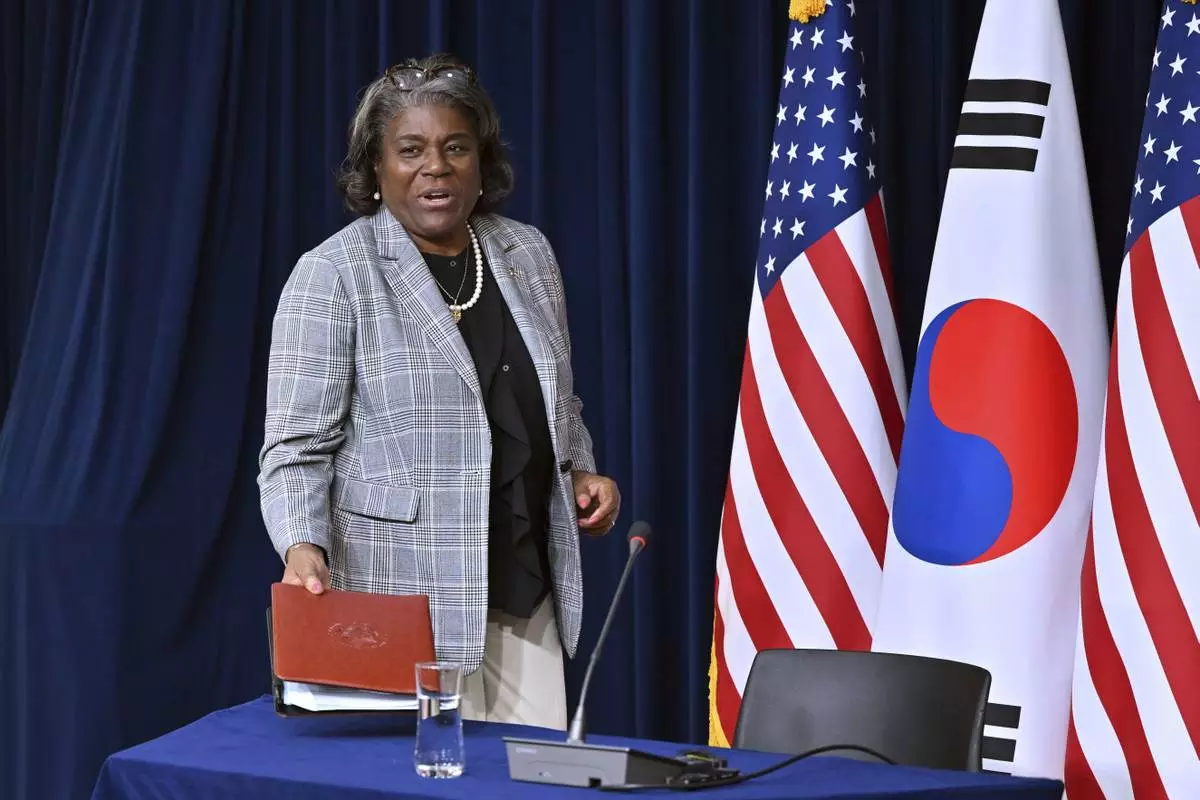
U.S. Ambassador to the United Nations Linda Thomas-Greenfield arrives to attend a press conference at the American Diplomacy House in Seoul Wednesday, April 17, 2024. (Jung Yeon-je/Pool Photo via AP)
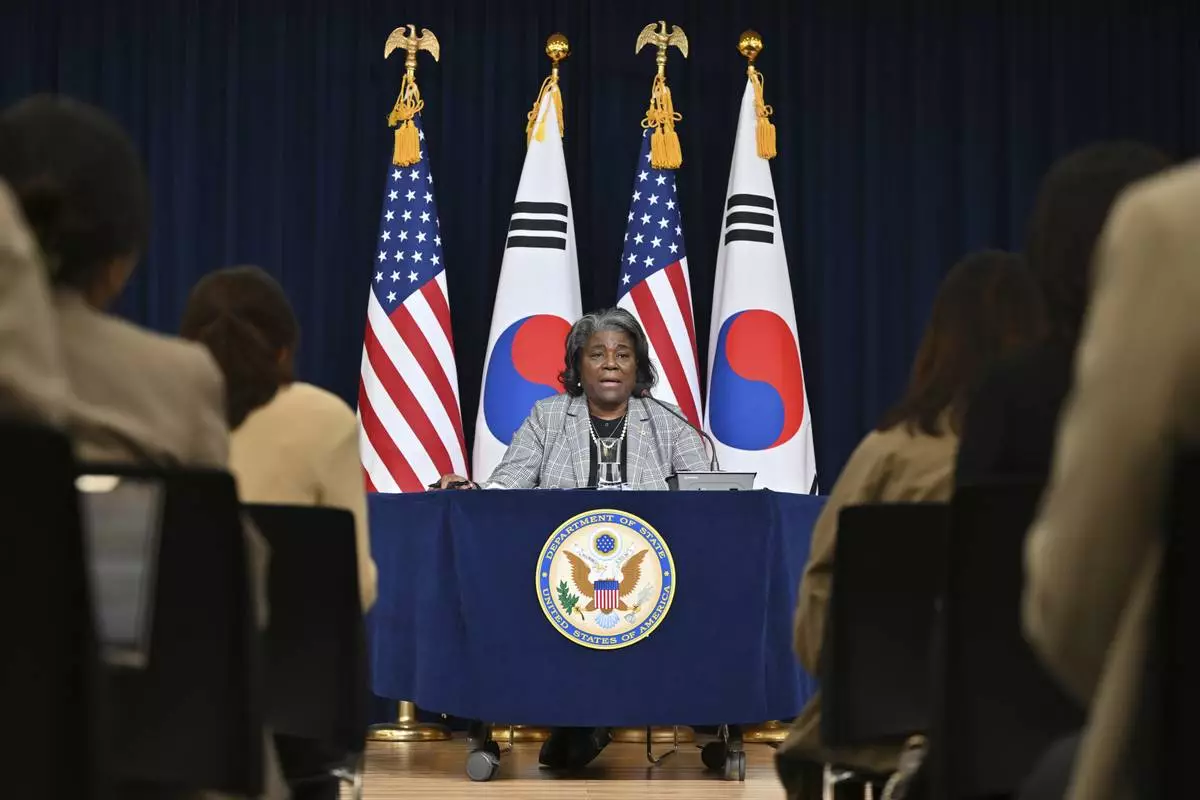
U.S. Ambassador to the United Nations Linda Thomas-Greenfield speaks during a press conference at the American Diplomacy House in Seoul Wednesday, April 17, 2024. (Jung Yeon-je/Pool Photo via AP)
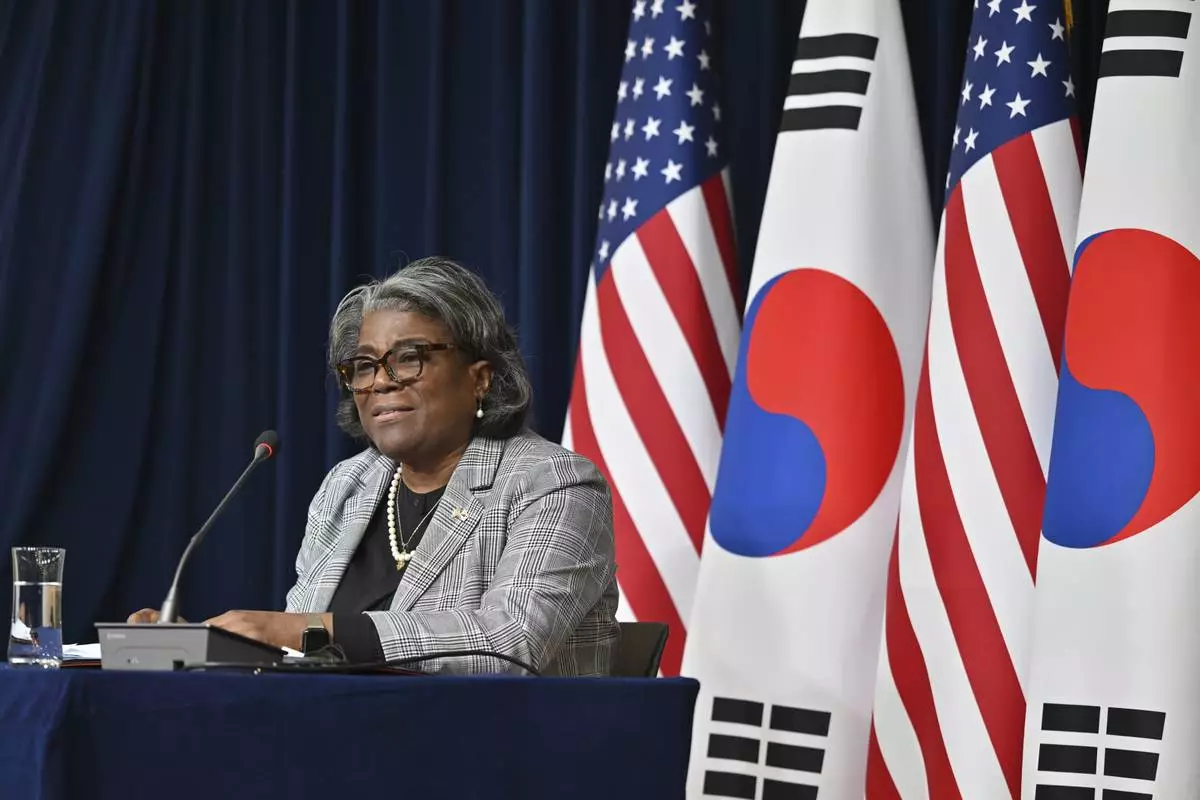
U.S. Ambassador to the United Nations Linda Thomas-Greenfield speaks during a press conference at the American Diplomacy House in Seoul Wednesday, April 17, 2024. (Jung Yeon-je/Pool Photo via AP)
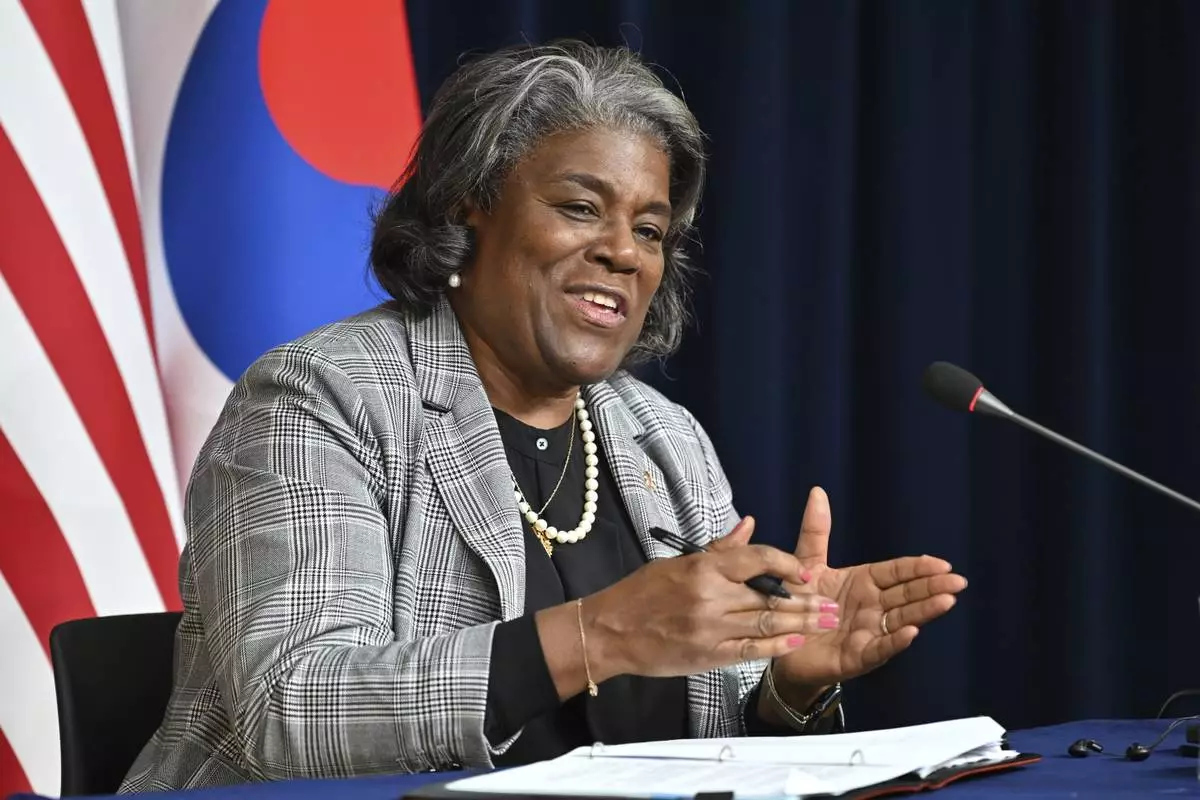
U.S. Ambassador to the United Nations Linda Thomas-Greenfield speaks during a press conference at the American Diplomacy House in Seoul Wednesday, April 17, 2024. (Jung Yeon-je/Pool Photo via AP)
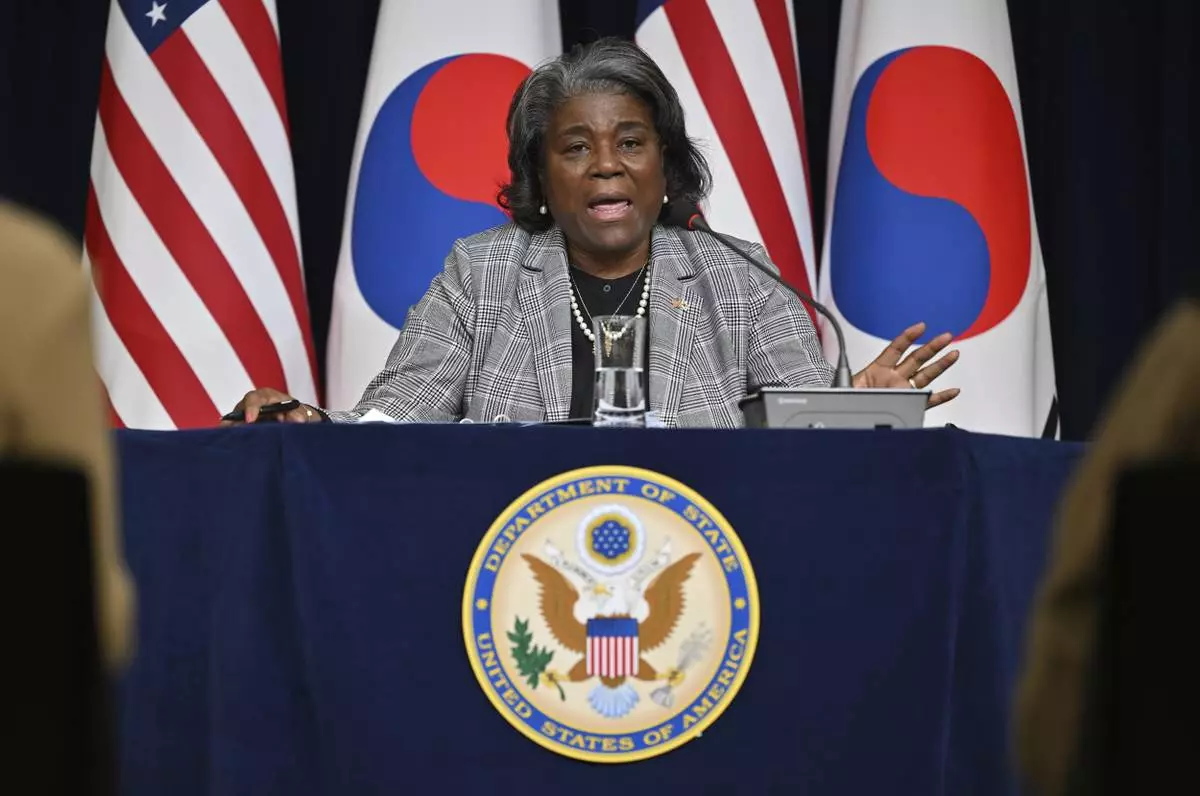
U.S. Ambassador to the United Nations Linda Thomas-Greenfield speaks during a press conference at the American Diplomacy House in Seoul Wednesday, April 17, 2024. (Jung Yeon-je/Pool Photo via AP)
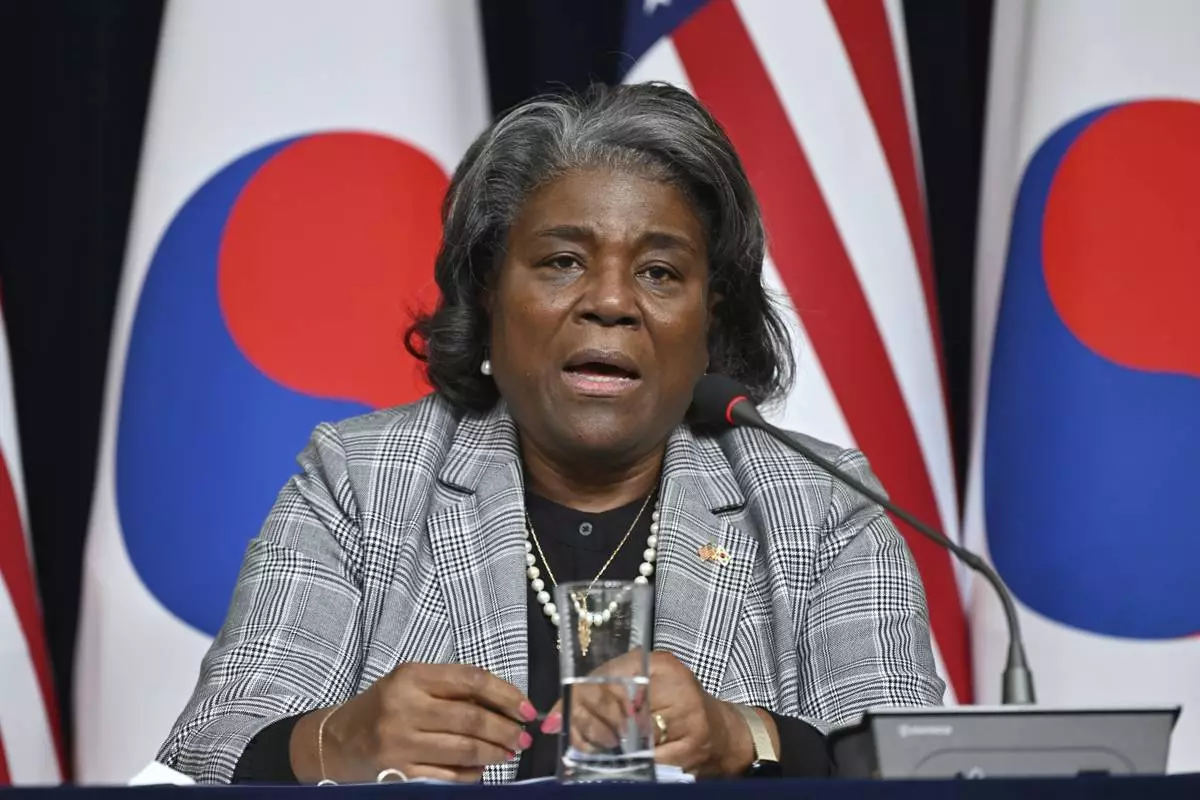
U.S. Ambassador to the United Nations Linda Thomas-Greenfield speaks during a press conference at the American Diplomacy House in Seoul Wednesday, April 17, 2024. (Jung Yeon-je/Pool Photo via AP)















